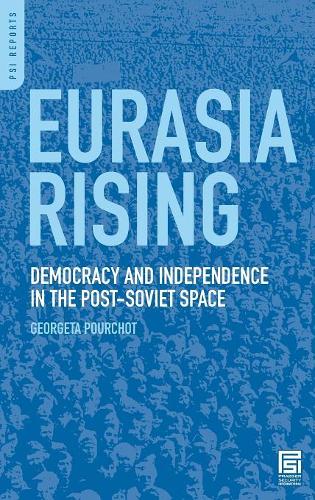
Eurasia Rising: Democracy and Independence in the Post-Soviet Space
(Hardback)
Publishing Details
Eurasia Rising: Democracy and Independence in the Post-Soviet Space
By (Author) Georgeta Pourchot
Bloomsbury Publishing PLC
Praeger Publishers Inc
30th July 2008
United States
Classifications
Tertiary Education
Non Fiction
321.80947
Physical Properties
Hardback
192
Width 156mm, Height 235mm
425g
Description
Although the score of countries comprising Russia's near abroad (the former non-Russian Soviet republics) and far abroad (the former non-Russian Warsaw Pact states) are behaving with variably increasing independence in their domestic and foreign policies, Russia continues to regard them as remaining within the same core-periphery sphere of influence formerly exerted by the Soviet Union within the same geographic space. Russia misinterprets bids by these countries to adopt liberalizing structural reforms and to join Euro-Atlantic organizations as foreign-inspired and inimical to Russia's security. Whether Russia can learn to recognize that such bids are in fact natural developments of national self-interest will determine whether healthy and mutually beneficial bilateral relations can develop between Russia and the states of her near and far abroad in the 21st century. No previous study of the dynamics of post-Soviet assertive sovereignty has as broad a geographic scope as Eurasia Rising, which considers the whole of Post-Soviet Space: DT Belarus, Moldova, Ukraine DT_ Estonia, Latvia, Lithuania DT Armenia, Azerbaijan, Georgia DT Kazakhstan, Kyrgyzstan, Tajikistan, Turkmenistan, Uzbekistan DT Albania, Bulgaria, Czech Republic, Hungary, Poland, Romania, Slovakia
Reviews
Eurasia Rising: Democracy and Independence in the Post-Soviet Space gives an interesting account of the events in what is usually dubbed Russia's near abroad, a vast geopolitical area which, instead of being Russia's asset, turned into her burden and a source of endless troubles. Georgeta Pourchot's book is certainly worth of academic attention due to the author's claim that the traditional/classical geopolitical considerations are not any longer sufficient for in-depth comprehension of the developments in the post-Soviet/post-Socialist area; instead, a set of more nuanced approaches is needed * Eurasian Home *
Author Bio
Georgeta Pourchot is Adjunct Professor of Foreign Policy and International Relations and Director of the online MA program in Political Science at Virginia Polytechnic Institute and State University. She is a fellow at the Center for Strategic and International Studies, where she directed the Euro-Atlantic Security Project. She was a founding member of the Romanian Green Party and served in the Romanian Chamber of Deputies. She is the author of Learning from Successful Cooperation in the Expanding European Space, Euro-Atlantic Integration for Ukraine and Future Security Roles of NATO and the EU: Central and Eastern European Contributions.
